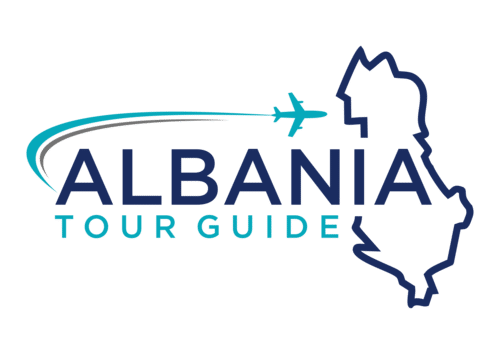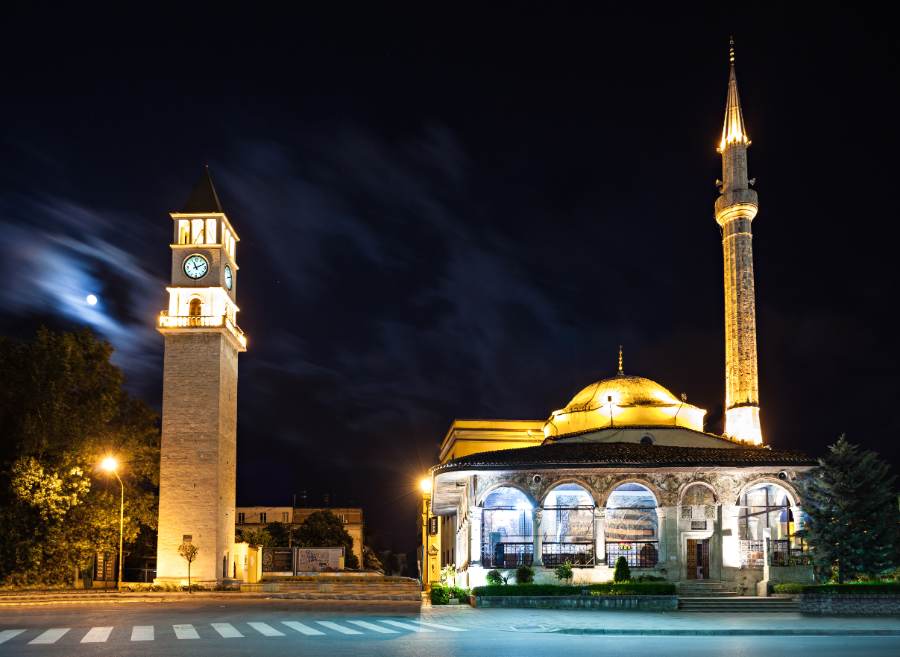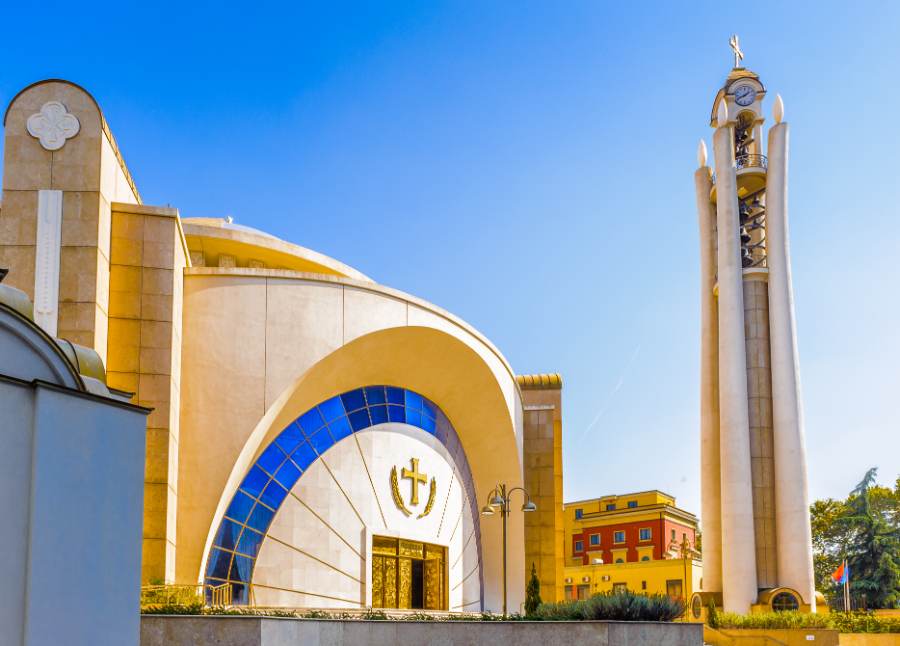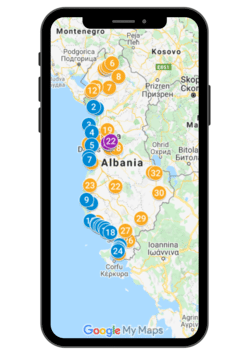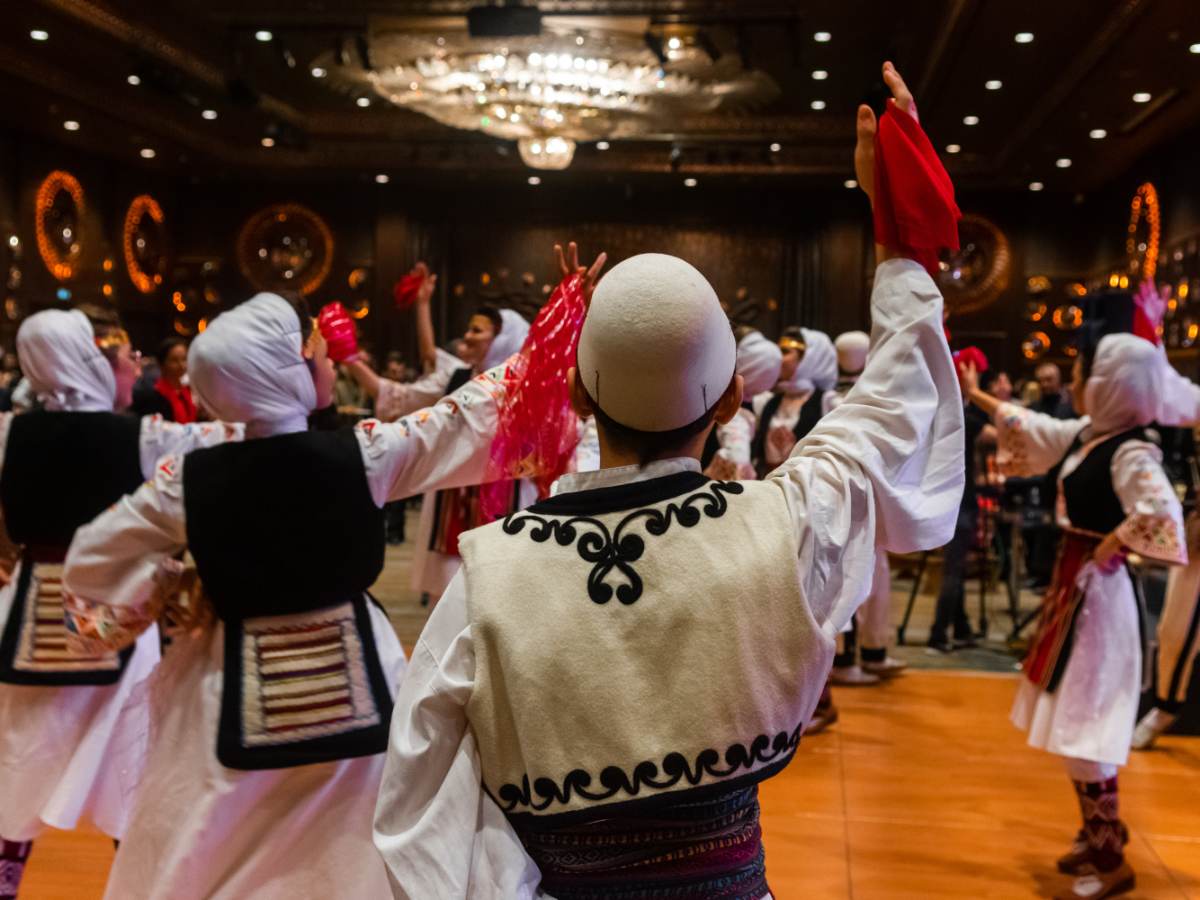
Do you have to cover your hair in Albania?
If you are planning to travel to Albania, you might be wondering if you have to cover your hair in Albania.
Do you have to cover your hair in Albania? You do not have to cover your hair in Albania. Although 56% of Albanians are Muslim according to Census; there are very few Albanian women who cover their hair. Women in Albania are modern and western, they wear tight and revealing fashion and no headscarf.
If you are wondering what it will be like for you as a woman to visit Albania, let me take you through the Albanian culture. So that you can be well prepared for your trip to Albania!
Should you cover your hair in Albania as a tourist?
You do not have to cover your hair in Albania as a tourist. Albania is a modern and free country, where women wear what they like and do as they please. Very few Albanian women cover their hair.
According to Census 2011, 56.7 % of Albanians are Muslims, 10% of Albanians are Catholics, 7% of Albanians are Orthodox, 5.5% of Albanians do not have a religion, 2.5% are atheists or a member of a minority religion and 2.1% of Albanians are Bektashi.
That data makes Albania unique in Europe because it is one of the few countries with a majority of Muslims.
However, Albanian Muslims are very “modern”. Very few Albanian women wear a headscarf. When you walk through the Albanian streets, you will hardly see any woman with a headscarf.
Moreover, Albanian women dress in short and revealing clothing. You will see a lot of western influence in their style. You will probably be surprised how much tight and sexy clothing you will see on the streets in Albania!
As Newsweek described in the below quote: “not a headscarf is to be seen, let alone a burqa”. And “women wear what they want and go and do as they please”. As an inhabitant of Albania, I can say that those two statements very accurately describe how Albanian women dress.
“Albania is unique – the only overwhelmingly Muslim country in the whole of Europe. But the paradox is that in the centre of the capital, Tirana, not a headscarf is to be seen, let alone a burqa. A Muslim city in purely numerical terms, it is a hard-line Muslim’s nightmare in most other senses. Women wear what they want and go and do as they please.” from Newsweek (source)
In fact, Albania is known worldwide for its “religious tolerance”. This basically means that Albanian Muslims, Christians and Orthodox communities live happily side-by-side. In Albania, it is not your religion that defines you. It is who you are as a person.
The Pope visited Albania and he gave a speech about how different religions happily live together in Albania. The pope actually said that he noted the peaceful coexistence and collaboration between different religions. And that there was mutual respect and trust between followers of different religions. And don’t forget that Albania on paper is a country with a majority of Muslims.
“To Pope Francis, this slip of a country in Europe’s forgotten southeast is a sign that “a culture of encounter is possible”. Addressing diplomats at the Vatican after the Paris killings, he lavished praise on the country he had visited the previous September, where he found relatively small Catholic and Orthodox Christian communities, plus a tiny congregation of Jews, co-existing happily with a far larger Muslim presence. Life in Albania, the Pontiff observed, was “marked by the peaceful coexistence and collaboration that exists among the followers of different religions in an atmosphere of respect and mutual trust”.” Quotes from Pope Francis from Newsweek (source)
A reporter from the United Nations visited Albania in 2017. The reporter wrote that Albania is a country with freedom of religion or belief. And that it is a practical reality in Albania that different religions live together in harmony.
“Freedom of religion or belief is a practical reality in Albania, and there is much the world can learn from the Albanian experience in respecting freedom of thought, conscience and religion or belief and achieving inter-religious harmony.” Quote from the United Nations Special Rapporteur on Religion and Belief Ahmed Shaheed from Equal Times (source)
Albanian women wear fashion from Italy and elsewhere in Europe. The Albanian women really like to doll themselves up and look pretty. They wear tight clothing, gala dresses and other fashion. In short, Albanian women wear what they like and choose what makes them feel pretty or fashionable.
Is Albania a Muslim country?
If you look at the data from Census 2011, and you read that 56.7 % of Albanians are Muslims. You might think that Albania is a Muslim country. However, Albania is actually known for religious tolerance and religious freedom.
I found a quote from Besar Likmeta who is a journalist in Tirana (see below). And he describes the Albanian culture as “Islam-lite”.
On the national holiday of Eid, you will certainly see families come together to share a meal. But it does not mean that everyone fasts during Ramadan. And it does not mean that everything is shut during Ramadam, life just goes on like normal during Ramadan.
Similarly, some people go to the mosque on Friday, but it certainly is not an overwhelming majority of people. Like with any religion, some Muslims are more involved in their religion than others.
“We have ‘Islam-lite’,” he says. “People like Eid, and some go to the mosque on Friday, but things like wearing the hijab are perceived as things that do not belong to our culture”. Quote from Besar Likmeta, a journalist in Tirana, who follows religious affairs taken from Newsweek (source)
Another quote from Besar Likmeta is very true as well. He states that Albanian people want to be western.
It is true that Albanian people look to West-Europe and the USA for answers. The Albanian people see Europe and the USA as their examples for the future.
“Albanians believe their country “was taken away from Europe and plunged into darkness by the Ottoman Empire – and that Islam was associated with that”, he says. One result, even among believing Muslims, is a deep-rooted Occidentalism that the Communist experience did little to alter: “For 50 years we were completely isolated and dreaming of coca cola! We don’t look East for answers but West. There has always been a feeling that we need to return to where we belong.” Quote from Besar Likmeta, a journalist in Tirana, who follows religious affairs taken from Newsweek (source)
A recent poll showed that 97% of Albanians want to join the European Union. (source)
Many Albanian families have a son or family members working abroad in Germany, Italy, the UK or elsewhere in Europe. The Albanian families at home hear about the greatness of these western countries. And an overwhelming number of Albanians want to join the European Union.
You will also see this as a tourist in Albania. The Albanians will approach you and ask you about your country. The Albanian people are simply incredibly curious about everything foreign and western.
Journalist Besar Likmeta was right when he said: “We don’t look East for answers but West”.
The Albanian people do not differentiate themselves as “Muslims” or “Christians”. They have a very strong nationalist feeling and pride because they are “Albanians”. Their goal is to be European and a part of the European Union as soon as possible.
Religious tolerance in Albania
Albania is known for religious tolerance. Which in simple words means that different religions respect each other. There is harmony between different religions in Albania.
BBC Travel actually wrote a very interesting article about Albania, calling Albania “the country that is famous for tolerance”.
“The reality is that Albania has long been regarded as a place of religious tolerance and harmony.” from BBC Travel (source)
Currently, a massive mosque is under construction in the centre of Tirana. It is hard to miss this impressive structure, as a tourist or visitor to the capital city.
However, there is an equally impressive Orthodox Cathedral about 1 minute from central Skanderbeg Square. This Orthodox cathedral is called the Resurrection of Christ Orthodox Cathedral.
It is very normal in Albania for one street to have a Catholic Church and a Mosque side by side.
It is also completely acceptable for people of different religious backgrounds to marry. As I said before, the Albanians do not differentiate themselves from others based on their religion. They feel that they are all “Albanians”, and love their national flag, national music and national language.
“Churches and mosques often occupy the same streets, and interfaith marriages are widely accepted within the culture.” from BBC Travel (source)
Religious tolerance and mutual respect between religions is not something new in Albania. In the Middle Ages, the Turkish Ottoman Empire invaded Albania. The Ottoman Empire wanted the Albanians to become Muslims because they would be more like Turks.
The funny thing is that many men converted to Islam to get the tax and employment benefits, as per the Ottoman Empire. Whilst the woman would remain Christian and continue celebrating Christian traditions.
You can see a perfect example of religious harmony in the UNESCO city of Berat. The Berat Castle on the top of the hill has 13 historical churches and 2 historical mosques. When the Ottoman Empire started ruling Albania, they added the mosques. But the Churches remained operational.
Inside the castle’s walls, you can also visit the Onufri Museum. Inside the Onufri Museum, you can see an iconic painting from the 18th century that shows a Christian scene with Minarets in the background. So the religious tolerance is something that has been a part of the Albanian culture for generations.
“Berat is especially noteworthy, as its Onufri Museum holds the Ikona Burimi Jetëdhënës (Icon of the Life Giving Source). This 18th-century Albanian work of art depicts a Christian scene with minarets rising in the background and is lauded as a symbol of the country’s famous religious harmony.” from BBC Travel (source)
During the communist period, religion took a turn for the worse in Albania. From the end of the Second World War until 1992, Albania was ruled by a strict communist regime.
In 1967, the communist dictator Enver Hoxha banned all religions. Essentially, Albania became the first atheist state in the world.
As a result, all churches, mosques and other religious places closed. But what is even worse, is that the beautiful historical mosques and churches were broken down. Some churches and mosques were turned into military storage depots, cinemas, dance halls and even hospitals. So the religious places that survived were damaged significantly by the communist regime.
“Buba is referring to the period between 1944 and 1992 when Albania was under a strict communist regime begun by dictator Enver Hoxha. Over the course of the regime, Albania became a complete isolationist state with virtually no ties to the outside world. In 1967, Hoxha tightened his grip on the country even further by banning all religion, declaring Albania the world’s first atheist state. During this time, churches and mosques were seized by the military and either destroyed or turned into cinemas or dance halls.” from BBC Travel (source)
It is a miracle that the small Et’hem Bey mosque on Skanderbeg Square in the centre of Tirana survived. The little Et’hem Bey mosque played an important role in the end of communism in Albania.
On the 18th of January 1991, 10.000 people entered the Et’hem Bey Mosque carrying flags. This was an incredibly risky move as religion was still banned by the communist government. But after the death of the communist dictator in 1985, the communist regime had become weaker. So none of the communist authorities intervened.
The 10.000 people reclaimed religious freedom for Albania. And soon after the communist regime fell and Albania began its path to democracy.
If you are interested in learning what life was like during the communist period in Albania, you can visit the fantastic Bunk’Art 1 Museum in Tirana. This fascinating museum is set inside a massive communist bunker on the outskirts of the city.
Very few people in the world have knowledge about Albania and its culture. But Albania is an excellent example of how different religions can peacefully co-exist. A few years ago, the Malbardh village in the North of Albania made headlines. Because the Muslim people raised funds to rebuild the local Catholic Church.
On one side the Malbardh village is a beautiful example of religious tolerance in Albania. On the other side, it is sad that it is not a more regular occurence. It would be lovely to see that followers of different religions help each other every day and everywhere in the world.
“To illustrate how religious harmony exists in Albania, he brought up the recent example of Malbardh, a small village in northern Albania. A few years ago, the little area made headlines across the country when the local Muslim population raised funds and rebuilt the village’s lone Catholic church, which had been torn down with so many others during Hoxha’s reign.” from BBC Travel (source)
What should I wear on my holiday in Albania?
You can wear your regular clothes on your holiday to Albania. You do not have to buy any special clothes for your holiday in Albania. Albanian women wear what they like and do as they please. And you as a foreigner on holiday can wear what you like too.
Can I wear a bikini or bathing suit on the beach in Albania?
You can definitely wear a bikini or bathing suit on the beach in Albania. The Albanian people do not wear a burkini on the beach.
What should I pack for Albania?
You should pack comfortable walking shoes, a jacket and swimwear.
Many of the sightseeing spots and cities in Albania are very hilly and uneven, so you will certainly need comfortable walking shoes.
Albania is a very mountainous country. So it may be warm at the coastline or in the valley, but it can be chilly at a higher altitude. And you will certainly climb or travel through higher altitudes, there is no way to avoid the mountains in Albania because they are everywhere.
I always recommend you bring swimwear to Albania. Albania has a stunning coastline in the South, called the Albanian Riviera. But along the Adriatic Sea in the North of Albania, there are some stunning rugged beaches too!
Albanian traditional clothing
Albanian traditional clothing is still very popular in Albania. Each region in Albania has its own colourful traditional clothing. On the streets in Albania, you may still see grandmothers and grandfathers wearing their traditional costumes. Some of these traditional costumes do include a thin white headcover for the women.
Most Albanians do have a set of traditional clothes from their region in their house. Because dressing up in the traditional clothes is still very popular at a wedding. And weddings are incredibly popular in Albania.

About me
I am an Albania Tour Guide, who organizes 1-day, 2-day or multiple day private tours in Albania. I arrange your transportation and I am your English speaking guide. So that, you get to experience the most beautiful places in Albania!
Kind regards, Manon

Welcome to Albania!
I am a Tour Guide in Albania
I am an Albania Tour Guide, who organizes 1-day, 2-day or multiple day private tours in Albania.
Book your free Albania Planning Session via Skype now, by using my online scheduler to find a time that’s convenient for you.
